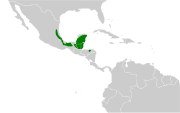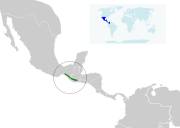Pampa (bird)
Appearance
| Pampa | |
|---|---|

| |
| Rufous sabrewing (Pampa rufa) | |
| Scientific classification | |
| Domain: | Eukaryota |
| Kingdom: | Animalia |
| Phylum: | Chordata |
| Class: | Aves |
| Clade: | Strisores |
| Order: | Apodiformes |
| Family: | Trochilidae |
| Tribe: | Trochilini |
| Genus: | Pampa Reichenbach, 1854 |
| Species | |
|
4, see text | |
Pampa is a genus of birds in the hummingbird family Trochilidae. These species are resident in northern Middle America.
Species
[edit]The genus contains three species.[1]
| Common name | Scientific name and subspecies | Range | Size and ecology | IUCN status and estimated population |
|---|---|---|---|---|
| Curve-winged sabrewing | Pampa curvipennis (Deppe, 1830) |
Mexico from San Luis Potosí south to Veracruz and Oaxaca
|
Size: Habitat: Diet: |
LC
|
| Wedge-tailed sabrewing | Pampa pampa (Lesson, 1832) |
Belize, Guatemala, Mexico, and possibly Honduras
|
Size: Habitat: Diet: |
LC
|
| Rufous sabrewing | Pampa rufa (Lesson, 1840) |
El Salvador, Guatemala, and Mexico.
|
Size: Habitat: Diet: |
LC
|
These three species were formerly placed in the genus Campylopterus. A molecular phylogenetic study published in 2014 found that the genus Campylopterus was polyphyletic.[2] In the revised classification to create monophyletic genera, these species were moved to the resurrected genus Pampa that had been introduced in 1854 by Ludwig Reichenbach.[1][3]
References
[edit]- ^ a b Gill, Frank; Donsker, David; Rasmussen, Pamela, eds. (July 2020). "Hummingbirds". IOC World Bird List Version 10.2. International Ornithologists' Union. Retrieved 5 January 2020.
- ^ McGuire, J.; Witt, C.; Remsen, J.V.; Corl, A.; Rabosky, D.; Altshuler, D.; Dudley, R. (2014). "Molecular phylogenetics and the diversification of hummingbirds". Current Biology. 24 (8): 910–916. Bibcode:2014CBio...24..910M. doi:10.1016/j.cub.2014.03.016. PMID 24704078.
- ^ Stiles, F.G.; Remsen, J.V. Jr.; Mcguire, J.A. (2017). "The generic classification of the Trochilini (Aves: Trochilidae): Reconciling taxonomy with phylogeny". Zootaxa. 4353 (3): 401–424. doi:10.11646/zootaxa.4353.3. PMID 29245495.



